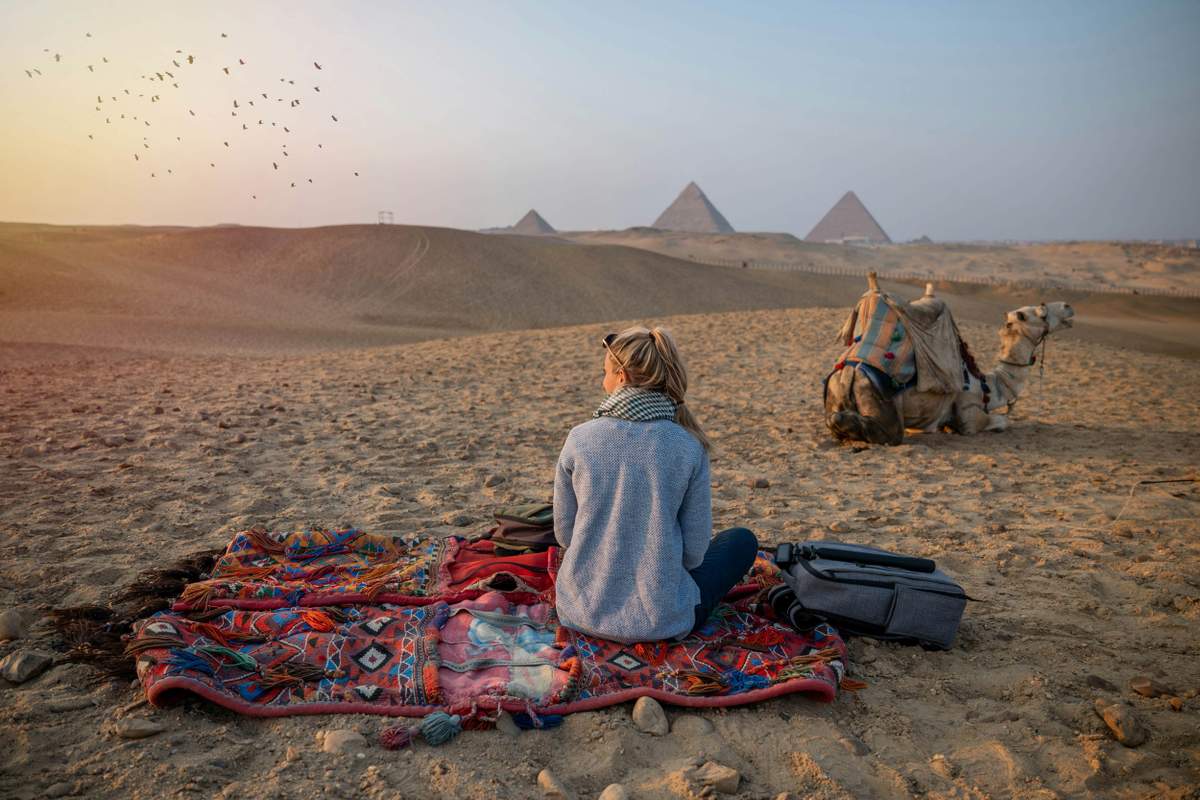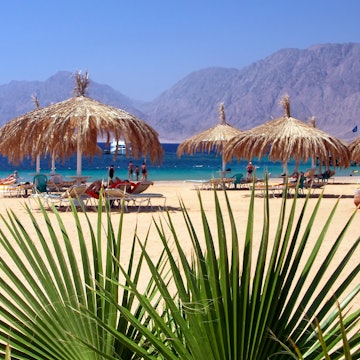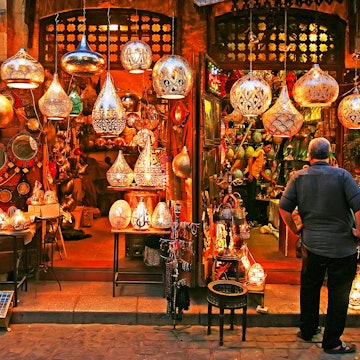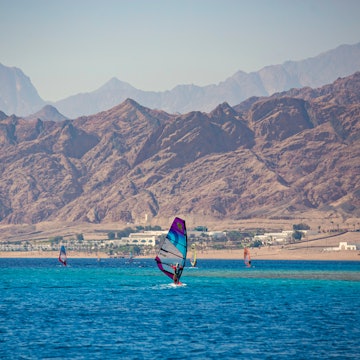
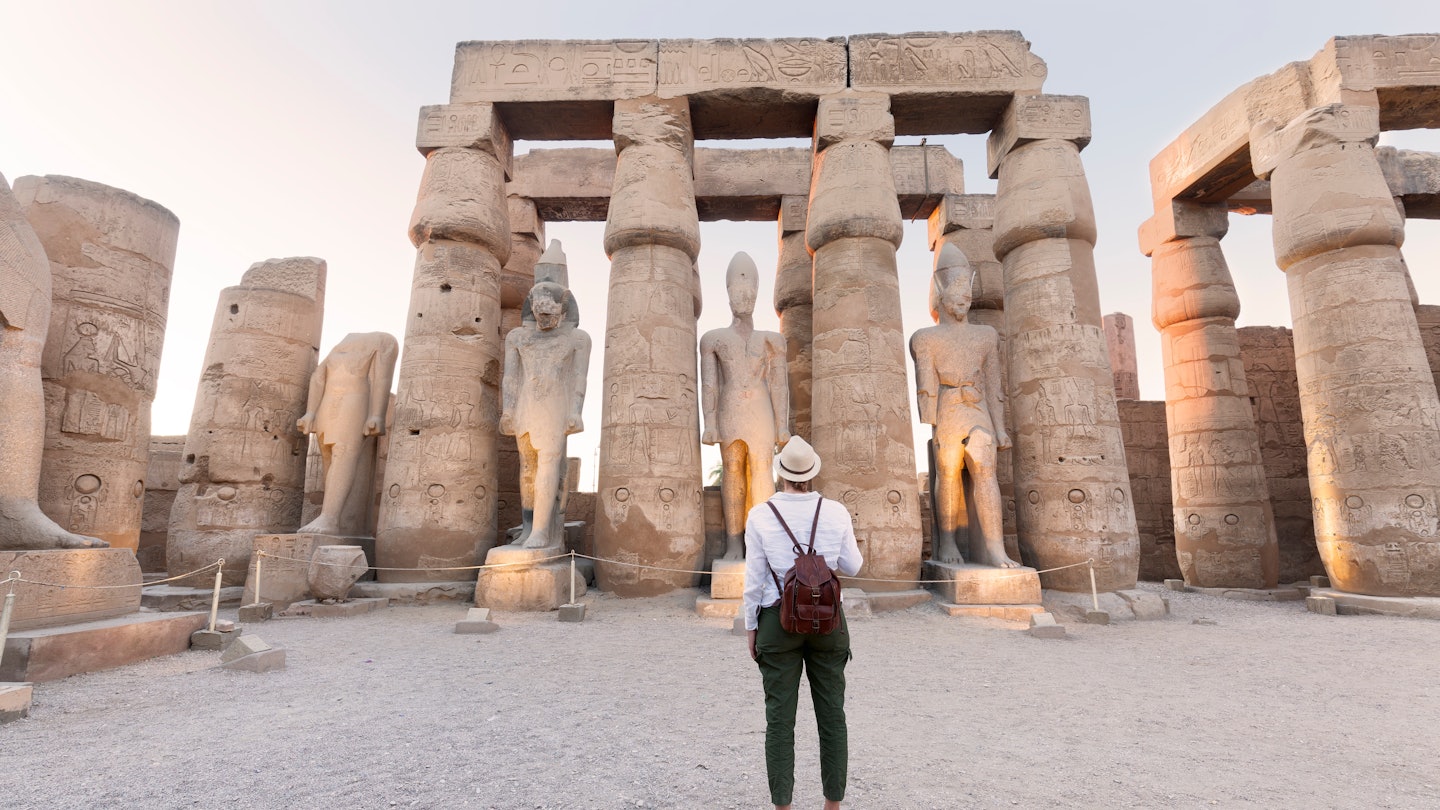
Egypt might seem like a tricky destination for women travelers, but a little knowledge and preparation will go a long way. xamnesiacx84/Shutterstock
Egypt needs little introduction, and its roll call of ancient sites and natural wonders, from tombs and temples on the Nile to the underwater world of the Red Sea, is unparalleled. Tourism to Egypt is booming – and the country is looking to double its current number of visitors to 30 million by 2030 – but for some women travelers, the idea of a trip here can give them pause. We won’t sugarcoat it because we’ve experienced it: Egypt can be a challenging place for women travelers, particularly women flying solo. That said, many women have a great time in Egypt, ourselves included, and a trip to the country can be transformative. Be prepared, arrive with an open mind and an open heart, and take a note from the Nile and go with the flow.
Should I take a tour of Egypt or travel independently as a solo woman?
Egypt isn’t particularly well set up for independent travelers; challenges include a lack of signage at ancient sites and public transportation that can be crowded, slow and difficult to use if you don’t speak Arabic. For first-time visitors, signing up for a guided tour of the country spares you from planning logistics and ensures you understand the significance of the temples and tombs thanks to a knowledgeable guide. For solo women travelers, look into options like G Adventures’ Solo-ish Egypt – only solo travelers can sign up, and the tour offers a good mix of “me days” of independence and “we days” with group activities. Or for a woman-led tour, consider Bellies En-Route, or the Women of Egypt Shopping and Food Tour.
That said, most tours pack the exact same historic sites into their itineraries with little deviation, so it may be worth tacking on a few extra days at the start or end of your trip, particularly in Cairo, Luxor and Aswan, to go off the beaten path and see what else the best places in Egypt have to offer. After taking a tour and learning the lay of the land, you’re better equipped to figure out transportation and make plans on your own.

What to wear in Egypt for women travelers
Even if you see influencers at the Pyramids of Giza or the Valley of the Kings doing otherwise, dressing modestly is essential in Egypt. Dress respectfully by covering your knees, cleavage and upper arms. You don’t need to wear an abaya (a flowing robe-like dress) or a headscarf unless you’re visiting a mosque. Before entering a mosque, ensure that you’re covered down to your ankles and wrists and have a scarf to cover your head. Cover-ups and headscarves are often available to borrow at mosques if you don’t have your own.
In Egypt’s Red Sea and Mediterranean beach resorts, shorts and sundresses are fine.
Getting around Egypt as a woman traveler
Ride-hailing apps like Uber, Careem and InDrive make getting around Egyptian cities a breeze without having to haggle with taxi drivers. Through the apps, you can share your location with friends and family for further peace of mind. No matter which type of taxi you go for, always sit in the back seat.
The Cairo Metro has women-only carriages, which are generally less crowded than mixed-gender cars. On all other public transport, try to sit next to a woman. Avoid traveling during rush hour. The squished-in-like-sardines microbuses that travel around Egyptian cities can be prime harassment territory, with little you can do about wandering hands.
Best places for women travelers to stay in Egypt
Accommodation options across Egypt are welcoming to women travelers. If you’re visiting Egypt on a budget, Cairo, Luxor and Aswan have good hostels, but be wary of some inexpensive hotels, which can be sketchy. Check guidebooks and online reviews or ask to see a room before you book.
International hotel chains have a growing presence in Cairo, Luxor, Hurghada and Sharm El Sheikh, and Downtown Cairo in particular has a good collection of midrange and high-end boutique options, such as Mazeej Balad, Immobilia and Eileen Hotel. Basata Eco-Lodge, a sustainability-focused beach camp near Nuweiba on the Sinai Peninsula, is the only place we’ve come across in Egypt that offers discounts for solo women travelers.

Going out in Egypt after dark
Egypt’s year-round hot desert climate has turned most of the country into night owls, so cities like Cairo and Luxor buzz with couples, families and friends out on the streets late into the night, especially during the holy month of Ramadan when Muslims fast from dawn to dusk. It’s generally safe to be out after dark in busier Cairo neighborhoods, such as downtown, Zamalek and Heliopolis, which also have the highest concentration of bars and nightlife venues. Zamalek in particular is a hopping international enclave with bars and restaurants that serve alcohol and are perfectly fine for solo women to sit in for a drink. Some cafes and baladi (local) bars tend to have all-male clientele and are better avoided if you’re on your own. If you’re trying to decide where to go, see whether local women and mixed groups of friends are sitting at the bar or cafe’s tables – if so, take a seat yourself.
Will I be harassed as a woman in Egypt?
Unfortunately, women travelers are often harassed in Egypt, usually on the street by men cat-calling or leering. Dressing modestly (covering shoulders and knees) helps with this, but doesn’t eliminate it entirely. The best way to deal with cat-calling and staring is to ignore it and keep walking. While these behaviors are annoying, they generally aren’t threatening and don’t escalate further. More serious harassment, such as being followed or groped in crowded public spaces, can happen, but is less common.
The other kind of hassle in Egypt – and it’s a big one – is from shopkeepers selling souvenirs, often in the “valley of the vendors” on the walking path to ancient sites, but also taxi drivers or boat captains hustling for business on the street, or animal owners offering rides on their camels and horses in Giza and Luxor. Be aware that if you show the slightest bit of interest or pick up an item from a shelf, the vendors are hard to shake off and might start following you if business is slow. If you’re not interested and ignoring them doesn’t feel like an option, be direct and say no. The social pressure can feel immense, but standing up for what you want (or, more likely, don’t want) is not rude or wrong.
Though Egypt isn’t the easiest destination for women travelers, the good certainly outweighs the bad. Random encounters and invitations, such as being offered tea by the guardian of a historic site, make small but memorable moments of a trip.






